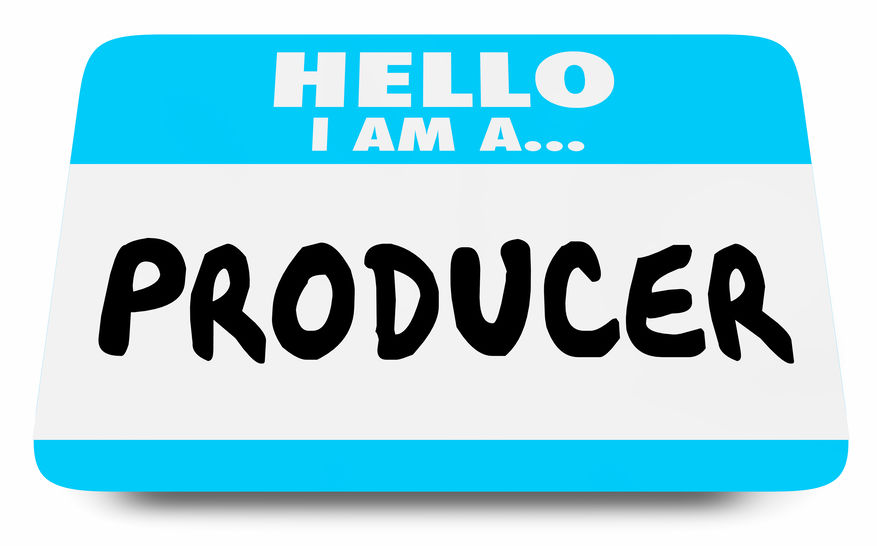A movie producer supervises the film’s production. Producers coordinate and arrange multiple aspects of film production, including organizing a movie’s writing, directing, editing, and financing.
Key Takeaways
- Producers oversee every stage of filmmaking, from securing scripts to distribution.
- They manage budgets, hire personnel, and ensure projects remain on track.
- Executive producers focus on financing, while other producers are more hands-on with production.
There are several types of producers, making a movie producer’s role one of the most involved and nuanced on a film set. Let’s break it down in more detail below.
Table of Contents
The Different Types of Producers
Movie producers are part of the above-the-line production team in a film production.
While movie and executive producers are the most well-known, the overall production team includes line producers, supervising producers, field producers, and production coordinators.
A producer’s role is divided into different parts, such as overseeing operations, logistics, administration, or more hands-on television production functions.
Here’s a quick breakdown of the different types of producers’ roles and their essential functions.
Executive Producer

An executive producer is the most prominent and misunderstood production role in movies. This role is the top producer, who is the film’s financier.
The executive producer supervises the team of producers to create the movie on time within a specific budget. They assemble a team to help execute a vision based on artistic and technical standards.
Line Producer
A line producer is involved in the film’s production from start to finish. This role oversees a movie’s logistics, operations, and technical needs.
The line producer works closely with other production team members, such as the production supervisor or manager.
Supervising Producer
A supervising producer is a managerial role supervising other producers and their respective functions. This role operates as a surrogate of the executive producer’s authority.
The supervising producer works directly with the directors, writers, department heads, and the production office.
Producer

The film producer oversees the production and development of the film. This role has several responsibilities, including securing the literary property, financing, hiring the director, selecting the cast, and negotiating rights.
Co-Producer
The co-producer is a collaborative role working in conjunction with another producer on the film. Individuals have roles that might not work directly on the movie but are involved in funding and providing equipment or services.
Production Coordinator
The production coordinator is an administrative role in charge of the production office. This role sets up staff, equipment, and supplies for the office.
The production coordinator handles travel arrangements, work permits, visas, schedules, and scripts for a film’s cast and crew.
Associate Producer
The associate producer is a below-the-line role that works directly under the producer’s supervision. This role has auxiliary functions like organizing the production team, overseeing construction, lighting and sound plans, and more.
The associate producer is technically not an official producer. Instead, other roles hold the title with an additional stake in developing the movies outside their traditional role.
The producer’s role in the three movie production stages

There are many moving parts to film production from start to finish. The producer is involved in the three main stages of filmmaking: pre-production, development, and post-production.
- Pre-production: the producer is responsible for securing the script and finances and building the team to create the film.
- In Production: the producer oversees the film set’s operation, ensuring that all roles, including financiers, crew, and actors, are all on the same page.
- Post-production: the producer organizes the film’s editing, marketing, and distribution.
Television Producers
Television producers are in charge of a different set of operations on a network program than movie producers. The two most common types are field producers and segment producers.
Field Producer (TV)
The field producer primarily has a television role overseeing the story’s development. This role is a liaison and communication between a newsroom and television crew.
The field producer works closely with other television production roles, such as the photographer or reporter, on research, interviews, and testimonials.
Segment Producer (TV)
The segment producer is primarily a television role that creates specific news programs, reality shows, or game shows. This role coordinates the setup and editing for the television segments and builds a team of assistants.
Interested in learning more about different film roles on a film set? Check out the FilmDaft Quick Guide to Film Set Roles.
Conclusion: The Many Responsibilities of Producers
There’s more to a film producer than meets the eye. There’s more than one type of producer; beyond that, there’s an endless list of roles and functions for producers in film and movies.
In pre-production, the producers build a budget, hire a team, secure locations, and create a schedule. In production, aka development, the producer’s primary mission is to oversee the day-to-day logistics. In post-production, the producers reconcile the budget and meet all the deadlines.
But overall, the producer will forever remain one of the most involved and nuanced roles on a film set.
Up Next: How to do location scouting.

